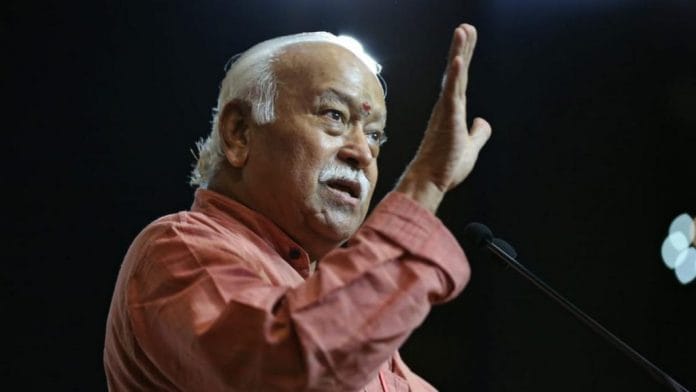New Delhi: The remarks made by Rashtriya Swayamsevak Sangh Sarsanghchalak (chief) Mohan Bhagwat earlier this month, that the DNA of Hindus and Muslims is the same, have kicked off a debate once again regarding “RSS and Muslims”.
Many commentators interpreted these remarks of the sarsanghchalak as a new attempt by the Sangh to reach out to Muslims. Is it really so? Is the Sangh extending an olive branch to Muslims, as the general stereotype — which has been promoted ever since its inception — has been that the Sangh is anti-Muslim?
Most commentators have missed the point as they interpreted Bhagwat’s comment from a political perspective ahead of the upcoming assembly polls for several states, including Uttar Pradesh, which is considered to be the most crucial in terms of catapulting the BJP, an ideological mentee of the RSS, to power at the Centre.
The fact of the matter is that if one looks at the ideological framework of the Sangh, Bhagwat’s comments seem to have been aimed at questioning the division of Bharatiya society into a majority and a minority.
His comments were, in fact, a reiteration of the RSS’ stand, which it has consistently followed since its inception in 1925, that whatever religion one may follow in India, no one should be seen from the prism of ‘majority’ or ‘minority’.
The RSS has always believed that by categorising society based on the way of worship is the root cause of ‘Muslim appeasement’ and ‘vote-bank politics’, which has done great harm to society, and hence the Sangh has always opposed it.
There is ample evidence what Bhagwat said was a reiteration of the RSS’ consistent stand on the issue of minorities. Several senior RSS functionaries have spoken on the same lines, including the past five sarsanghchalaks.
Manmohan Vaidya, at present the Sah Sarkaryavah (joint general secretary) of the RSS, had made a similar statement in an interview in 2017 (RSS Interviews, Vichar Vinimay Prakashan, April 2017, p.25).
“In Bharat, traditionally, we believe that all religions lead to the same destination and hence are equal,” he had said. “Ninety-nine per cent of Muslims and Christians in India are converted, having origin in Bharat. Then how can a mere change of faith make them qualify as minorities?”
Also read: 1956 Niyogi panel and Meenakshipuram 1981: Defining moments of religious conversions debate
Not a recent phenomenon
Many commentators often tend to conclude that the Sangh started this engagement with Muslims recently but they are mistaken.
The second RSS Sarsanghchalak M.S. Golwalkar’s exchange of letters with several Muslim intellectuals and luminaries (Shri Guruji Samagra, Volume 7, Prabhat Prakashan, P.154-158) clearly indicates that the Sangh’s engagement with Muslims isn’t a new process.
He also clearly mentioned in several interviews and speeches as well as Q&A sessions with people from various walks of society (Shri Guruji Samagra, Volume 9) that being a Muslim or Christian doesn’t come in the way of having a ‘Hindu Rashtra’. They are as much part of the Hindu Rashtra as any other Hindu is.
Sunil Ambekar, who is at present the Akhil Bharatiya Prachar Pramukh (head of the media/publicity wing of the RSS), has elaborated on this issue in detail (The RSS Roadmaps 21st Century, Rupa Publications, 2019).
“The forefathers of Muslim and Christian populations in India, too, lived by following the Hindu way of life,” he has said. “In our country, many forms of worship developed over several millennia, and so there was no discrimination on the basis of faith or the form and manner of worship.”
“To be born an Indian means to be a descendant of Indian culture; it is not just the physical act of being born, it is being mindful of a cultural ethos laid down by our progenitors…. The motherland is not a territorial map; she is a great spiritual being,” he has added.
Dwelling upon the issues, he further writes, “Hindu Rashtra is not anti-Muslim. It never was. India’s socio-political kernel is that of ‘Hindu Rashtra’, hence different sects of Islam, Christianity and other religions still practise their faith and rituals openly and freely in India… Therefore, it is absolutely wrong to present Hindutva as a narrow idea to our future generations.”
Nandakumar, the national convenor of Prajna Pravah, an RSS-inspired organisation of intellectuals, has quoted an interesting comment of Guruji, who was Sarsanghchalak from 1940 to 1973, in a published work two years ago (Hindutva for the changing times, Indus Scrolls Press, 2019).
“In an interview to Dr Saifuddin Jilani, Guruji says: Indianisation does not mean converting all people to Hinduism. Let us all realise that we are the children of this soil and we must have allegiance to this land. We belong to the same society and our ancestors are common,” Nandakumar has written. “Understanding this is Indianisation in the real sense. Indianisation does not mean that one should be asked to quit his religious system. We neither said this, nor we are going to say so. Rather we believe that a single religious system for the entire human society is not suitable.”
(The writer is a research director with Delhi-based think-tank Vichar Vinimay Kendra. He has authored two books on the RSS. Views expressed are personal)
Also read: This is Modi govt’s 3-pronged strategy for J&K before it begins to talk full statehood






